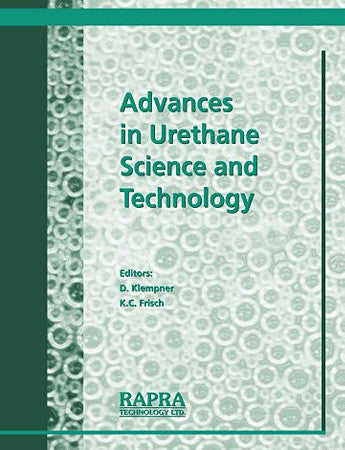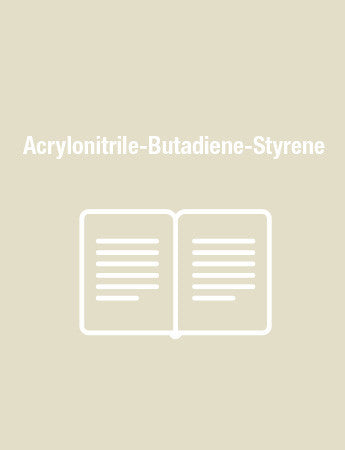Advances in Urethane Science and Technology
This book presents reports on state-of-the-art developments in the field of urethane science, written by experts in their field. This volume is extensively illustrated and referenced.
The reports in this book are highly technical with an emphasis on industrial applications. This book will be invaluable to researchers and anyone involved with producing or using
The reports in this book are highly technical with an emphasis on industrial applications. This book will be invaluable to researchers and anyone involved with producing or using
1. Dimensional Stabilizing Additives for Flexible Polyurethane Foams
2. Surfactants in Polyurethane Foam Production with Liquid CO2 Blowing
3. Polyurethane Processing: Recent Developments
4. Open Cell Polyurethane-Filled Vacuum Insulated Panels
5. Stabilizing Behavior of Silicone Surfactants During Polyurethane Processing
6. Synthesis and Characterization of Aqueous Hybrid Polyurethane-Urea-Acrylic/Styrene Polymer Dispersions
7. Adhesion Behavior of Urethane
8. HER Materials for Polyurethane Applications
9. Polyol Molecular Weight Distribution Effects on Mechanical and Dynamic Properties of Polyurethanes
2. Surfactants in Polyurethane Foam Production with Liquid CO2 Blowing
3. Polyurethane Processing: Recent Developments
4. Open Cell Polyurethane-Filled Vacuum Insulated Panels
5. Stabilizing Behavior of Silicone Surfactants During Polyurethane Processing
6. Synthesis and Characterization of Aqueous Hybrid Polyurethane-Urea-Acrylic/Styrene Polymer Dispersions
7. Adhesion Behavior of Urethane
8. HER Materials for Polyurethane Applications
9. Polyol Molecular Weight Distribution Effects on Mechanical and Dynamic Properties of Polyurethanes
Daniel Klempner, a Research Professor and Executive Director of the Center of Excellence in Polymer Research and Environmental Studies (CEPRES), is an internationally known expert in polyurethane chemistry and technology, as well interpenetrating polymer networks. Dr. Klempner received a B.S. in Chemistry from Rensselaer Polytechnic Institute (1964), M.S. from Williams College (1968), and Ph.D. in Physical Chemistry from the State University of New York at Albany (1970). Prior to joining the faculty of the University of Detroit in 1972, Dr. Klempner worked as a chemical engineer for Sprague Electric Co., from 1964 to 1968, and from 1970 to 1972 he was a Visiting Scientist in the Polymer Science and Engineering Program of the University of Massachusetts.
Today, he conducts extensive research in the area of polymer science and engineering, especially interpenetrating polymer networks (IPNs), polymer alloys, polyurethanes, structure-property relationships, high-temperature polymers, flammability of polymers, coatings, elastomers, foams, medical applications of polymers, and energy absorption of polymers. Dr. Klempner has over 150 publications, 20 books and
numerous patents.
Kurt C. Frisch was the Director of the Polymer Institute of the University of Detroit Mercy until his untimely death in 2000. He was a world known authority on polyurethane chemistry and technology. Dr. Frisch received undergraduate and graduate training at the Universities of Vienna, Brussels, and Columbia University, and earned M.A. and Ph.D. degrees from the latter institution. He worked as a research chemist at General Electric Company from 1944 to 1952 and as Assistant Manager of Research with E.F. Houghton & Co. from 1952 to 1956. From 1956 to 1968, Dr. Frisch was employed by Wyandotte Chemicals Corporation (now BASF), where he held positions as Manager of Polymer Research, Director of Applications Research, and Director of Polymer Research and Development. It was here that Dr. Frisch made major contributions to polymer science by developing the first low-cost polyurethane foam. After serving as an Adjunct Professor from 1965 to 1968 while still in the industry, Dr. Frisch joined the teaching staff at the University of Detroit on a full-time basis and established the Polymer Institute.
He has written, co-authored, or edited over 275 scientific papers and 38 books on polymer research. He also holds over 55 US patents along with several hundred foreign patents in his field.
Today, he conducts extensive research in the area of polymer science and engineering, especially interpenetrating polymer networks (IPNs), polymer alloys, polyurethanes, structure-property relationships, high-temperature polymers, flammability of polymers, coatings, elastomers, foams, medical applications of polymers, and energy absorption of polymers. Dr. Klempner has over 150 publications, 20 books and
numerous patents.
Kurt C. Frisch was the Director of the Polymer Institute of the University of Detroit Mercy until his untimely death in 2000. He was a world known authority on polyurethane chemistry and technology. Dr. Frisch received undergraduate and graduate training at the Universities of Vienna, Brussels, and Columbia University, and earned M.A. and Ph.D. degrees from the latter institution. He worked as a research chemist at General Electric Company from 1944 to 1952 and as Assistant Manager of Research with E.F. Houghton & Co. from 1952 to 1956. From 1956 to 1968, Dr. Frisch was employed by Wyandotte Chemicals Corporation (now BASF), where he held positions as Manager of Polymer Research, Director of Applications Research, and Director of Polymer Research and Development. It was here that Dr. Frisch made major contributions to polymer science by developing the first low-cost polyurethane foam. After serving as an Adjunct Professor from 1965 to 1968 while still in the industry, Dr. Frisch joined the teaching staff at the University of Detroit on a full-time basis and established the Polymer Institute.
He has written, co-authored, or edited over 275 scientific papers and 38 books on polymer research. He also holds over 55 US patents along with several hundred foreign patents in his field.




